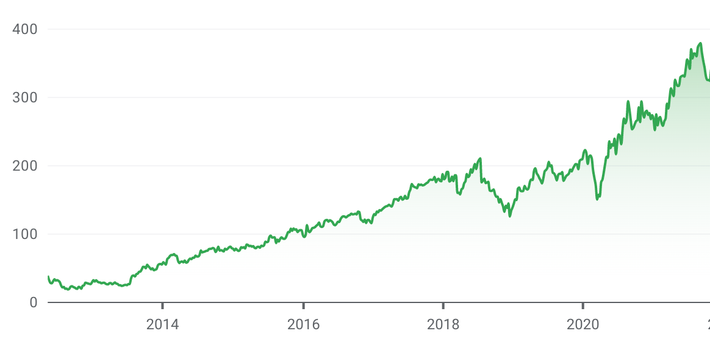
The recent story of Meta, née Facebook, has really been two stories. One of them, going back some time now, is about a brand in crisis. 2016 was “the year Facebook became the bad guy.” The next two years were the ones that “shook Facebook.” 2018 brought 15 months of “fresh hell” for the company, before, in 2020, amid some perhaps more salient issues facing the company and the world, Fast Company awarded it “worst brand of the year.” 2021 was “Facebook’s very bad year,” according to The Guardian. “No, really, it might be the worst yet.”
The other story, which didn’t discredit the first one but certainly didn’t agree with it, was basically a line going up and to the right:
Was Facebook destroying democracy, driving your family and friends insane, racking up thousands of dollars in future therapy bills for your kids, and fracking the discourse until the water isn’t safe to drink? Okay, maybe. But, and, it was also a strong buy — every “worst” year also its best one yet.
These parallel stories started converging right after the crop in this chart, in September of 2021, when Facebook’s stock peaked above $353. The next month — almost exactly a year ago — Facebook molted into Meta, a “Social Technology Company” with a foot in the metaverse.
Over the next year, its stock halved in value and Meta saw its first reported declines in daily users, as well as its first year-over-year decline in revenue.
With its Q3 earnings announcement, Facebook’s two stories became one, with the stock chart corroborating that the company is indeed in crisis. For the second quarter in a row, its revenue declined, and the company projected more pain next quarter. Its operating margin fell from 36 percent to 20 percent year over year, and its net income fell by a shocking 52 percent. “While we face near-term challenges on revenue, the fundamentals are there for a return to stronger revenue growth,” Mr. Zuckerberg said. The stock tumbled in after-hours trading and at Thursday’s open it was below $100 for the first time since 2016 — the first of its Very Bad Years. It is now down about 70 percent from its highs last year shortly before the rebranding.
A broad slump in tech stocks, challenging macro conditions, and even-worse-than-expected fallout from Apple’s restrictive App Tracking Transparency rules share some blame here. Meta has company: Snapchat’s earnings were a disaster, and Alphabet blamed its own bad quarter on “pullbacks in advertiser spends.”
But Meta’s bad quarter, and bad year, also belong squarely to Meta. The company lost more than $9 billion on Reality Labs, which encompasses most of its VR and Metaverse ventures, so far this year. This new line of business — the plan for a post-Facebook Meta — has been losing more money by the quarter as its revenue has decreased. Recent reporting from both the New York Times and Wall Street Journal suggested that the project is internally regarded as a disaster and a distraction. (If you’re still not sure what the metaverse is, or is supposed to become, Meta has happened upon an early use case: It’s a place where you can send billions of dollars to make it disappear.)
Mark Zuckerberg’s story here remains the same: The core business still makes a lot of money, and the metaverse is the next big thing, and we’ll be ready for that, but it’s going to take a while, so please be patient. Which, sure, but we should be as clear as possible about what this means. That core business does continue to make a lot of money, but every possible alarm is going off regarding its future prospects.
Facebook, the main app, is not a healthy platform; within Facebook, it’s understood to be in a sort of managed decline, as users in its most mature and lucrative markets continue to use and enjoy it less; Meta’s big plan for the platform is to replace its guts with a TikTok-style recommendation engine, which, considering the raw material it will be working with, sounds like a rolling family reunion hosted in a chumbox. Instagram is hemorrhaging attention to TikTok, and is midway through an unbecoming transformation into a TikTok clone — a playbook that worked for Facebook, when it copied Twitter for the News Feed, and for Instagram, when it incorporated a version of Snapchat’s Story feature, but which, this time around, seems mostly to be alienating users, creators, and advertisers. Meta, in other words, is profoundly remaking the older services that make the vast majority of its money. It’s taking a serious risk in doing so — materially, tampering with or failing to save these services is much more significant than Meta’s metaverse spending. But it’s also not clear that the company has a better option. It took half a decade for Facebook’s foul vibes to catch up with it, which doesn’t bode especially well for Instagram in 2023.
And while it’s easy to joke about the specifics of Meta’s metaverse work, the promotion of which has included staggering quantities of raw Zuckerberg, this, too, should be understood as riskier, and weirder, than Meta would have us think. Meta became one of the largest companies in the world by selling ads on two of the largest social-media platforms on the internet; it did this with a combination of shrewdness, ruthlessness, and a great deal of good timing and luck. Now, the plan is basically to manifest a whole new more favorable environment in which it’s free to grow without limits again. It’s a blank slate within a blank slate! It’s nothing like anything the company has succeeded with before. It’s ambitious, because it has to be, and we can’t ignore it, because Meta is spending billions to make it happen. But nobody has to pretend it makes much sense, either! Not even Wall Street.































